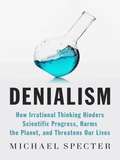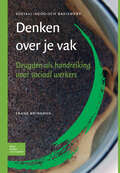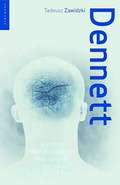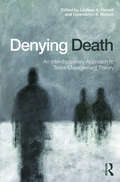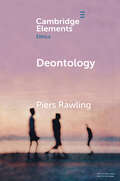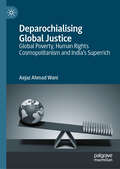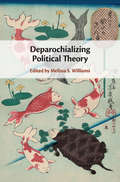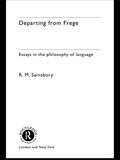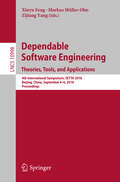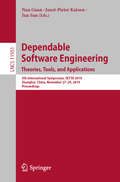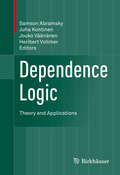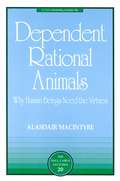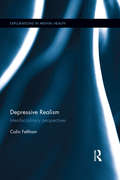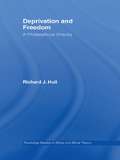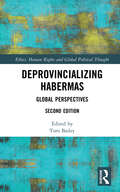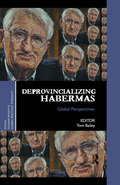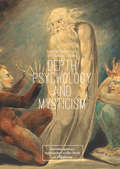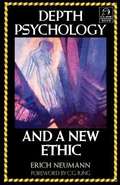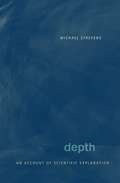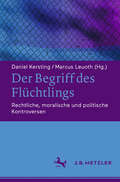- Table View
- List View
Demos Rising: Democracy and the Popular Construction of Public Power in France, 1800–1850 (The Life of Ideas)
by Stephen W. SawyerA political history exploring the concept of demos in the French government during the period of 1800 to 1850. In his previous book, Demos Assembled, historian Stephen W. Sawyer offered a transatlantic account of the birth and transformation of the modern democratic state. In Demos Rising, he presents readers of political history with a prequel whose ambitious claim is that a genuine demos became possible in France only with the development of government regulation and administration. Focusing on democracy as a form of administration rather than as a form of sovereignty allows Sawyer to explore urban planning, work and private enterprise, health administration, and much more as cornerstones of a self-governing society of equals. Examining the period between 1800 and 1850, Sawyer studies a set of thinkers who debated at length over the material problems of everyday life, sparking calls for political action and social reform in the face of conflict wreaked by deforestation, urbanization, health crises, labor relations, industrial capitalism, religious tensions, and imperial expansion. The solutions to these problems, Sawyer argues, were sought—and sometimes found—not through elections, as one might assume, but rather through the “care for all” promised by modern administrative power, regulatory intervention, and social welfare programs. By studying this profound transformation in governance, the book wagers, we can better understand the origin and meaning of democracy—even when events in our own time have thrown the concept into doubt.
Den Dingen auf der Spur: Zum Umgang mit Gegenständen in Kindheit und Jugend
by Petra Götte Wiebke WaburgIm Band wird die Frage nach der Verankerung von Dingen in sozialen und kulturellen Praxen von (und mit) Kindern, aber auch von (und mit) Jugendlichen in den Fokus gerückt. Es geht darum, wie sich im Umgang mit den Dingen leibliches Erleben entfaltet, wie Dingen Bedeutung zugeschrieben wird, wie sie zu Symbolen werden, wie mit ihnen Übergänge, Rollen- und Geschlechterstereotype, generationale und kulturelle Differenzen, Machtverhältnisse und Regierungsspielräume konstituiert, aber auch verschoben werden.
Denialism: How Irrational Thinking Harms the Planet and Threatens Our Lives
by Michael SpecterAt a time when our planet is in dire peril, Americans mistrust science more than ever. Few journalists appreciate what is at stake better than Michael Specter, who has spent the last twenty years reporting on everything from the AIDS epidemic to the digital revolution. In Denialism, he eloquently shows how, in a world where protesters march against childhood vaccines and Africans starve to death rather than import genetically modified grains, we must reconnect with the rational thinking that has underpinned the advance of civilization since the eighteenth century. What emerges is a manifesto that brilliantly captures one of the pivotal clashes of our era.
Denken ohne fachliches Geländer?: Ethik-Unterricht zwischen den Disziplinen (Ethik und Bildung)
by Laura Martena Anne BurkardDie meisten Ethik-Fächer in Deutschland sind als Alternativ- oder Ersatzfächer für den Religionsunterricht konzipiert. Eine Herausforderung betrifft die Verortung eines Teils dieser Fächer zwischen Philosophie, Religionswissenschaft und weiteren Disziplinen. Am Beispiel des Faches Werte und Normen diskutiert dieser Band Fragen, die sich für alle multidisziplinären Ethik-Fächer stellen: Was bedeutet es für die Konzeption, die Unterrichtspraxis und die Lehrkräftebildung eines Faches, wenn es an mehreren Bezugsdisziplinen ausgerichtet ist? Wie sollten die Bezüge verbunden oder abgegrenzt werden? Welche Konzepte für die Fachentwicklung gibt es?
Denken over je vak: Deugden als handreiking voor sociaal werkers (Sociaal agogisch basiswerk)
by BSL Fictief F. BrinkmanHet belangrijkste instrument dat sociaal werkers hebben, zijn zij zelf. Het vak vraagt dan ook als geen ander om bespiegeling. Nadenken over je vak kan je op vier punten verder helpen; je leert hoe je moet handelen, je verbetert je handelen, je kunt omgaan met frustraties en je weet wat ervoor zorgt dat je plezier in je werk houdt. In je eentje kom je ver, maar niet ver genoeg. Andere mensen kunnen je helpen je zelfonderzoek te verdiepen en te verfijnen. Omgekeerd kun jij anderen helpen. Het ligt daarom voor de hand reflectie te verbinden met communicatie en handelen. Denken over je vak, deugden als handreiking voor sociaal werkers gaat daarom niet alleen over denken maar ook over doen. Concreet helpt dit boek je vragen te stellen over kwaliteiten in je werk én daarop antwoorden te formuleren. Het stelt de aloude deugdenleer voor als instrument waarmee (aankomend) professionals hun positie kunnen bepalen, accenten leggen en keuzes maken. Deugdzaamheid is daarbij klankbord, richtingaanwijzer en toetssteen. Brinkman koppelt deugden aan de leercirkel van ervaren, overdenken, ontwerpen, testen en weer ervaren. Hij geeft ze daarmee herkenbare praktijktoepassingen. Hieromheen vindt de lezer veel begrippen uit filosofie en sociologie die het denken over het vak inhoud en structuur geven. Studievragen en columns nodigen uit tot bezinning, individueel en met medestudenten of collega's.
Dennett
by Tadeusz ZawidskiTadeusz Zawidzki outlines Dennett's reconciliation of three major components-thought, consciousness, and freedom of the will-with what science tells us about human nature. In the course of this exposition, the book highlights the important role that Darwinian thinking plays in Dennett's proposed reconciliation, as well as his innovative proposals regarding the 'reality' of our consciousness and its attributes.
Denying Death: An Interdisciplinary Approach to Terror Management Theory
by Lindsey A. Harvell Gwendelyn S. NisbettThis volume is the first to showcase the interdisciplinary nature of Terror Management Theory, providing a detailed overview of how rich and diverse the field has become since the late 1980s, and where it is going in the future. It offers perspectives from psychology, political science, communication, health, sociology, business, marketing and cultural studies, among others, and in the process reveals how our existential ponderings permeate our behavior in almost every area of our lives. It will interest a wide range of upper-level students and researchers who want an overview of past and current TMT research and how it may be applied to their own research interests.
Denying Death: An Interdisciplinary Approach to Terror Management Theory (The\enlightenment World Ser.)
by Lindsey A. Harvell Gwendelyn S. NisbettThis volume is the first to showcase the interdisciplinary nature of Terror Management Theory, providing a detailed overview of how rich and diverse the field has become since the late 1980s, and where it is going in the future. It offers perspectives from psychology, political science, communication, health, sociology, business, marketing and cultural studies, among others, and in the process reveals how our existential ponderings permeate our behavior in almost every area of our lives. It will interest a wide range of upper-level students and researchers who want an overview of past and current TMT research and how it may be applied to their own research interests.
Deontic Logic and Legal Systems
by Pablo E. Navarro Jorge L. RodrÍguez Eugenio Bulygin Pablo E. Navarro Jorge L. RodríguezA considerable number of books and papers have analyzed normative concepts using new techniques developed by logicians; however, few have bridged the gap between the Continental (i. e. , European) and Latin American traditions in legal philosophy. This book addresses this issue by offering an introductory study on the many possibilities that logical analysis offers the study of legal systems. The volume is divided into two sections: The first covers the basic aspects of classical and deontic logic and its connections, advancing an explanation of the most important topics of the discipline by comparing different systems of deontic logic and exploring some of the most important paradoxes in its domain. The second section deals with the role of logic in the analysis of legal systems by discussing in what sense deontic logic and the logic of norm-propositions are useful tools for a proper understanding of the systematic structure of law. Arguments are provided to stress the relevance of a systematic reconstruction of law as a necessary step in the identification of the truth conditions of legal statements and the reasons for accepting or rejecting the validity of logical consequences of enacted legal norms.
Deontology (Elements in Ethics)
by Piers RawlingDeontology is a theory about how we should act, morally speaking. It comes in several varieties, but all share certain doctrines, many of which are close to those found in the so-called 'common-sense morality' of the Western world. And all varieties are united in their opposition to consequentialism, a theory that, in its simplest form, tells us that we should always act so as to maximize impersonal value by bringing about the best consequences. This Element presents some of the different versions of deontology, including the views of W. D. Ross, and, to a lesser extent, Immanuel Kant. It defends certain deontological tenets, while challenging others, and contrasts them with consequentialism. Deontology and consequentialism are two of the main contenders in ethical theory, but virtue ethics is another, and it too is addressed (briefly), with an attempt to see it, in its most plausible form, as part of deontology.
Deparochialising Global Justice: Global Poverty, Human Rights Cosmopolitanism and India’s Superrich
by Aejaz Ahmad WaniThis book offers a deparochial account of global justice and addresses disenchantment stemming from its West-centricity and provincial theoretical formulations. As the recurring global poverty debate restricts the duties of alleviating poverty and inequality to the developed world, this book attempts to broaden the spectrum of duties to the superrich of the developing world. Drawing from the case study of India’s superrich as an exemplar of the potent agency of rising powers, the book examines the structural relationship between unbridled affluence and the (un)realisation of the human rights of the poor. It contends that India’s superrich, like their counterparts in other powerful developing countries, both contribute as well as benefit from the highly decentralised global economic order that (re)produces affluence of the few and deprivation of the many within these countries. In doing so, this book argues that the superrich have a positive duty to alleviate poverty and reduce inequality beyond their free-standing moral responsibility for philanthropy.
Deparochializing Political Theory
by Melissa S. WilliamsIn a world no longer centered on the West, what should political theory become? Although Western intellectual traditions continue to dominate academic journals and course syllabi in political theory, up-and-coming contributions of 'comparative political theory' are rapidly transforming the field. Deparochializing Political Theory creates a space for conversation amongst leading scholars who differ widely in their approaches to political theory. These scholars converge on the belief that we bear a collective responsibility to engage and support the transformation of political theory. In these exchanges, 'deparochializing' political theory emerges as an intellectual, educational and political practice that cuts across methodological approaches. Because it is also an intergenerational project, this book presses us to re-imagine our teaching and curriculum design. Bearing the marks of its beginnings in East Asia, Deparochializing Political Theory seeks to de-center Western thought and explore the evolving tasks of political theory in an age of global modernity.
Departing from Frege: Essays in the Philosophy of Language (International Library of Philosophy)
by Mark SainsburyFrege is now regarded as one of the world's greatest philosophers, and the founder of modern logic. Mark Sainsbury argues that we must depart considerably from Frege's views if we are to work towards an adequate conception of natural language. This is an outstanding contribution to philosophy of language and logic and will be invaluable to all those interested in Frege and the philosophy of language.
Dependable Software Engineering. Theories, Tools, and Applications: 4th International Symposium, Setta 2018, Beijing, China, September 4-6, 2018, Proceedings (Lecture Notes in Computer Science #10998)
by Xinyu Feng Markus Müller-Olm Zijiang YangThis book constitutes the proceedings of the Third International Symposium on Dependable Software Engineering: Theories, Tools, and Applications, SETTA 2018, held in Beijing, China, in September 2018. The 9 full papers presented together with 3 short papers were carefully reviewed and selected from 22 submissions. The purpose of SETTA is to provide an international forum for researchers and practitioners to share cutting-edge advancements and strengthen collaborations in the field of formal methods and its interoperability with software engineering for building reliable, safe, secure, and smart systems.
Dependable Software Engineering. Theories, Tools, and Applications: 5th International Symposium, SETTA 2019, Shanghai, China, November 27–29, 2019, Proceedings (Lecture Notes in Computer Science #11951)
by Nan Guan Jun Sun Joost-Pieter KatoenThis book constitutes the proceedings of the 5th International Symposium on Dependable Software Engineering: Theories, Tools, and Applications, SETTA 2019, held in Shanghai, China, in November 2019. The 8 full papers presented were carefully reviewed and selected from 26 submissions. They present cutting-edge advancements in the field of formal methods and its interoperability with software engineering and focus on the application of formal techniques and tools for building reliable, safe, secure, and smart systems with multi-dimensional complexities.
Dependence Logic
by Samson Abramsky Juha Kontinen Jouko Väänänen Heribert VollmerIn this volume, different aspects of logics for dependence and independence are discussed, including both the logical and computational aspects of dependence logic, and also applications in a number of areas, such as statistics, social choice theory, databases, and computer security. The contributing authors represent leading experts in this relatively new field, each of whom was invited to write a chapter based on talks given at seminars held at the Schloss Dagstuhl Leibniz Center for Informatics in Wadern, Germany (in February 2013 and June 2015) and an Academy Colloquium at the Royal Netherlands Academy of Arts and Sciences (March 2014). Altogether, these chapters provide the most up-to-date look at this developing and highly interdisciplinary field and will be of interest to a broad group of logicians, mathematicians, statisticians, philosophers, and scientists. Topics covered include a comprehensive survey of many propositional, modal, and first-order variants of dependence logic; new results concerning expressive power of several variants of dependence logic with different sets of logical connectives and generalized dependence atoms; connections between inclusion logic and the least-fixed point logic; an overview of dependencies in databases by addressing the relationships between implication problems for fragments of statistical conditional independencies, embedded multivalued dependencies, and propositional logic; various Markovian models used to characterize dependencies and causality among variables in multivariate systems; applications of dependence logic in social choice theory; and an introduction to the theory of secret sharing, pointing out connections to dependence and independence logic.
Dependent Rational Animals
by Alasdair Macintyre"MacIntyre--one of the foremost ethicists of the past half-century--makes a sustained argument for the cetnrality, in well-lived human lives, of both virtue and local communities of giving and receiving. He criticizes the mainstream of Western ethics, including his own previous position, for not taking seriously the dependent and animal sides of human nature, thereby overemphasizing the powers of reason and the pursuit of reason and the pursuit of autonomy. . . . This important work in ethics is essential for the professional philosopher and is highly readable for students at all levels and for thoughtful citizens." --Choice
Depressive Realism: Interdisciplinary perspectives (Explorations in Mental Health)
by Colin FelthamDepressive Realism argues that people with mild-to-moderate depression have a more accurate perception of reality than non-depressives. Depressive realism is a worldview of human existence that is essentially negative, and which challenges assumptions about the value of life and the institutions claiming to answer life’s problems. Drawing from central observations from various disciplines, this book argues that a radical honesty about human suffering might initiate wholly new ways of thinking, in everyday life and in clinical practice for mental health, as well as in academia. Divided into sections that reflect depressive realism as a worldview spanning all academic disciplines, chapters provide examples from psychology, psychotherapy, philosophy and more to suggest ways in which depressive realism can critique each discipline and academia overall. This book challenges the tacit hegemony of contemporary positive thinking, as well as the standard assumption in cognitive behavioural therapy that depressed individuals must have cognitive distortions. It also appeals to the utility of depressive realism for its insights, its pursuit of truth, as well its emphasis on the importance of learning from negativity and failure. Arguments against depressive realism are also explored. This book makes an important contribution to our understanding of depressive realism within an interdisciplinary context. It will be of key interest to academics, researchers and postgraduates in the fields of psychology, mental health, psychotherapy, history and philosophy. It will also be of great interest to psychologists, psychotherapists and counsellors.
Deprivation and Freedom: A Philosophical Enquiry (Routledge Studies in Ethics and Moral Theory)
by Richard HullDeprivation and Freedom investigates the key issue of social deprivation. It looks at how serious that issue is, what we should do about it and how we might motivate people to respond to it. It covers core areas in moral and political philosophy in new and interesting ways, presents the topical example of disability as a form of social deprivation, shows that we are not doing nearly enough for certain sections of our communities and encourages that we think differently about how we should best organise our societies in the future. The book develops a comprehensive yet refreshingly simple account of human freedom, which shows how the ability to realise our freedom is partly definitive of freedom itself. That account conclusively illustrates how many deprivations represent remediable inequalities of important and very basic human freedoms, posing the question as to why societies continue to do so little about them. In answering that question, Hull shows how the idea of social exclusion is misleading and, instead, tackles the far more pertinent and challenging issue of societies' failure to include. The moral seriousness of non-inclusion, the failure to provide for freedom, is evaluated via critical discussion of a variety of central themes and distinctions in ethical and political theory. The author shows how such themes and distinctions comprise a framework for evaluating a raft of social issues, in turn providing a unique resource for students of moral, political and applied philosophy. The book concludes with an innovative, challenging and effective combination of analytic and continental styles, so to address the critical question of how we might actually motivate constructive social change. In doing so, it shows how a variety of approaches can work successfully together to provide an emphatic case for greater social inclusion. Deprivation and Freedom shows how even fairly modest claims about social provision illustrate that we should be doing a lot more about social deprivation than we are now. It should be of interest to anyone who is concerned with questions about the type of society in which they live, what it says about us to continue as we are - and how we might motivate realistically achievable social change.
Deprovincializing Habermas: Global Perspectives (Ethics, Human Rights and Global Political Thought)
by Tom BaileyThis book provides a rich and systematic engagement with Jürgen Habermas’ political theory from critical perspectives outside its Western locus. It constructively examines the theory’s implications for non-‘Western’ contexts ranging from Latin America and the Middle East to India and China, and for themes ranging from cosmopolitanism, democracy and human rights to colonialism, feminism, care, modernity, and religion. The chapters added to the second edition explore Habermas’ own recent response to the charge of ‘provincialism’. The book will be of special interest to scholars and students of political theory, global justice, international affairs, philosophy, and critical theory, and also to those working in postcolonial studies, religious studies, sociology and cultural studies.
Deprovincializing Habermas: Global Perspectives (Ethics, Human Rights and Global Political Thought)
by Tom BaileyThis volume engages with Jürgen Habermas’s political theory from critical perspectives beyond its Western European origins. In particular, it explores the challenges of democratizing, decolonizing and desecularizing his theory for global contexts, and proposes ‘deprovincializing’ reformulations for contemporary political and social issues.
Depth Psychology and Mysticism (Interdisciplinary Approaches to the Study of Mysticism)
by Thomas Cattoi David M. OdorisioSince the late 19th century, when the “new science” of psychology and interest in esoteric and occult phenomena converged – leading to the “discovery” of the unconscious – the dual disciplines of depth psychology and mysticism have been wed in an often unholy union. Continuing in this tradition, and the challenges it carries, this volume includes a variety of inter-disciplinary approaches to the study of depth psychology, mysticism, and mystical experience, spanning the fields of theology, religious studies, and the psychology of religion. Chapters include inquiries into the nature of self and consciousness, questions regarding the status and limits of mysticism and mystical phenomenon, and approaches to these topics from multiple depth psychological traditions.
Depth Psychology and a New Ethic
by C. G. Jung Gerhard Adler Erich Neumann James Yandell Micha NeumannThe modern world has witnessed a dramatic breakthrough of the dark, negative forces of human nature. The "old ethic," which pursued an illusory perfection by repressing the dark side, has lost its power to deal with contemporary problems. Erich Neumann was convinced that the deadliest peril now confronting humanity lay in the "scapegoat" psychology associated with the old ethic. We are in the grip of this psychology when we project our own dark shadow onto an individual or group identified as our "enemy," failing to see it in ourselves. The only effective alternative to this dangerous shadow projection is shadow recognition, acknowledgement, and integration into the totality of the self. Wholeness, not perfection, is the goal of the new ethic.
Depth: An Account of Scientific Explanation
by Michael StrevensWhat does it mean for scientists to truly understand, rather than to merely describe, how the world works? Michael Strevens proposes a novel theory of scientific explanation and understanding that overhauls and augments the familiar causal approach to explanation. What is replaced is the test for explanatorily relevant causal information: Strevens discards the usual criterion of counterfactual dependence in favor of a criterion that turns on a process of progressive abstraction away from a fully detailed, physical causal story. The augmentations include the introduction of a new, non-causal explanatory relevance relationâe"entanglementâe"and an independent theory of the role of black-boxing and functional specification in explanation. The abstraction-centered notion of difference-making leads to a rich causal treatment of many aspects of explanation that have been either ignored or handled inadequately by earlier causal approaches, including the explanation of laws and other regularities, with particular attention to the explanation of physically contingent high-level laws, idealization in explanation, and probabilistic explanation in deterministic systems, as in statistical physics, evolutionary biology, and medicine. The result is an account of explanation that has especially significant consequences for the higher-level sciences: biology, psychology, economics, and other social sciences.
Der Begriff des Flüchtlings: Rechtliche, moralische und politische Kontroversen
by Daniel Kersting Marcus LeuothSeit Jahren wird wieder aufgeregt über Flüchtlinge diskutiert – über offene und geschlossene Grenzen, berechtigte und unberechtigte Asylansprüche, über Aufnahme und Abschiebung. Welche Rechte Geflüchtete haben und welche Pflichten ihnen gegenüber bestehen, ist umkämpft. Der Band analysiert zentrale Probleme dieser moralischen, rechtlichen und politischen Debatten und der sozialen Praktiken des Umgangs mit Geflüchteten. Zugleich führt er in Grundbegriffe der aktuellen Flucht- und Flüchtlingsforschung ein und stellt dafür den Begriff des Flüchtlings selbst in den Fokus der interdisziplinären Untersuchung.


